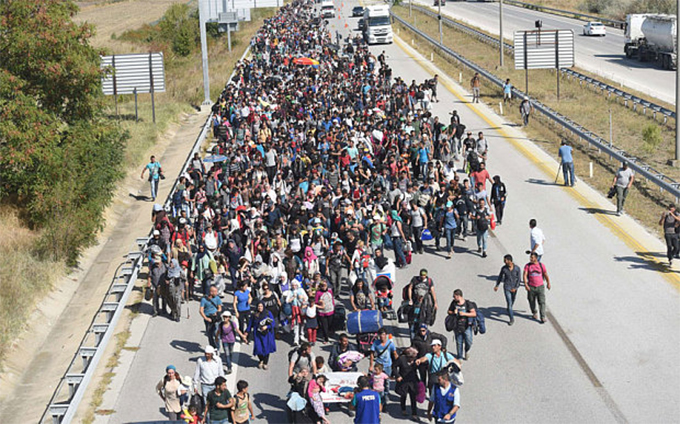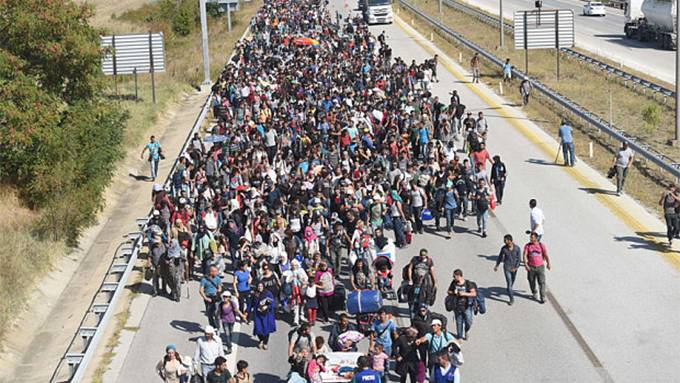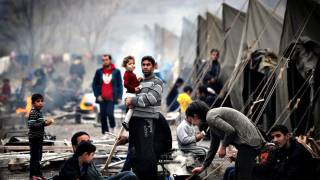An interview with a Syrian refugee smuggler
Source: newrepublic.com

“I just sent four boats to Greece,” a calm voice boasts on the other end of the phone line. “I’ve got ten thousand dollars in my pocket.” His customers know him as Malik al-Behar (The King of the Shores) or simply as al-Khal (The Uncle), a 38-year old Syrian who has built a sizeable human smuggling operation here in the ancient Turkish port of Izmir.
When we met al-Khal in late September, he was organizing two to three trips a day to the Greek island of Lesbos, about eight miles from the Turkish coastline. He fits 30 to 50 people a raft and charges $1,000 to $1,500 per person. Each crossing costs him between $10,000 and $15,000. In the past two years, he claims to have made more than $2 million.
With nearly 400,000 people arriving illegally in Greece this year, the refugee crisis has been good to him. And he is not alone: the underground economy of human smuggling is thriving. According to some calculations, there are up to 2,000 fellow smugglers in Izmir, while the trade on European territory is thought to employ up to 30,000 people.
We meet al-Khal at a café overlooking the beautiful bay in this, Turkey’s third largest city. He shows off some of his merchandise: fake Turkish, Syrian, and European ID cards, driver’s licenses, and passports. He assures us these documents sell for as much as several thousand Euros.
Before he was the King of the Shores, al-Khal was an officer in the Syrian military. In April 2012, he received orders to shoot at peaceful demonstrators on the outskirts of Damascus. He chose instead to defect, along with 50 of his subordinates, and join the Free Syrian Army in Homs. Once in rebel territory, he opened a weapons factory, which he says he still runs, supplying RPGs, GRAV missiles, sniper telescopic sights, Kalashnikovs, 9mm pistols, and other weaponry to a number of actors fighting in the brutal conflict. Al-Khal continues to fund an FSA brigade, though he considers the rebel forces to be in disarray and left the fighting behind in 2014 after suffering a serious injury in combat.
As we sip our Turkish coffees, al-Khal gets a call from an associate who informs him that 500 people trying to cross the land border with Greece close to Edirne have been turned back by Turkish police. He can’t resist a grin: A safe overland route would spell the end of his business.
Later he takes us for a walk through the central Izmir neighborhood of Basmane, where hundreds of refugees huddle on the sidewalks waiting for smugglers to take them to sea. On one corner, a young man is helping his elderly mother try on a bright orange life jacket sold by a street peddler. You can find ones like it at most of the stores in the area, even fashionable men’s clothing outlets. They are manufactured in Izmir and are not quite up to safety standards. Inflatable pneumatic tubes, waterproof pouches, and external smartphone chargers are also in good supply. Dingy hotels in Basmane offer a night’s stay at inflated prizes, although many people simply set up camps on the sidewalks, the squares, and the courtyard of the neighborhood’s central mosque. A handwritten sign in Arabic adorns a tree: “We buy Syrian gold.”
Several weeks after our conversation, al-Khal left Turkey for reasons that he would not disclose. He does, however, maintain that his business remains active and that he continues to “help the people” make their way to Europe. Our conversation from Izmir was edited for clarity and condensed.
Mrie and Winograd: Why did you wait until 2012 to defect?
al-Khal: At the beginning, there was not so much serious killing. We were using other methods: tear gas and those types of things. It was only in 2012 that we started to get direct instructions to kill people.
M and W: Why didn’t you stay with the FSA?
al-Khal: The revolution is very chaotic. It is not organized. But this is not the main reason I left. The main reason is that I was injured and I was forced to go to Turkey to get treatment. When I was in Turkey, they closed the border and the roads to Homs and I couldn’t get back. So I started to get involved in the smuggling trade. My cousin was working in the business, so I was helping him. He used to have a boat to take people from Mersin [a coastal city in Turkey] directly to Italy. We organized nine trips, each time transporting around 150 people. We didn’t lose a boat.
M and W: How much did he charge per person?
al-Khal: Roughly $10,000 dollars.
M and W: Where is your cousin now?
al-Khal: In Germany. After my cousin left to Germany I had to leave Mersin, because the Turkish government started to clamp down on human smuggling there. After that I came to Izmir to start my business again.
M and W: Do you need to a pay off Turkish authorities or can you control the smuggling trade on your own?
al-Khal: The Turkish government doesn’t really get involved in this. But civilian individuals do get involved.
M and W: Like who?
al-Khal: The people who own the land that we use as point of departure for the boats. When you want to send a boat you have to first make a deal with the landowner. They get paid for every trip: $5,000, sometimes $6,000, sometimes $8,000.
M and W: Tell me more about your expenses.
Al-Khal: My work is special. I can send you the messages I receive from my clients when they reach Greece. I am really honest with people. That is why I am very popular here and I get more than 1,500 calls a day. I have six phones. My employees answer all the phone calls. And by the way, while we are sitting here my bodyguards are all around us. I have thirteen men who are keeping an eye on this place right now.
I bring the rubber boats from Europe. The price, including the motor, is $8000 dollars. I know I can get a cheaper price, but I am concerned about the safety of my people. My reputation is the only thing I have. Other smugglers put 60 people on the boat. I try the number never to exceed 45. When it comes to safety, I don’t even trust my own people to tell me what is going on, I try to contact the refugees directly to ask them how many are going on the boat. Every trip costs me between $10,000 and $15,000. And I charge $1,200 for every passenger.
M and W: Have you ever run into any trouble with the Turkish authorities or the police?
al-Khal: Well, we try our best not to get involved with them. We try not to make them angry.
...
Read the rest: newrepublic.com






















